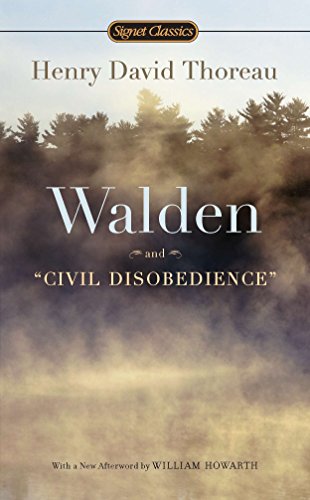-
Walden and Civil Disobedience
Henry David Thoreau, W. S. Merwin, William Howarth
Mass Market Paperback (Signet, July 3, 2012)Henry David Thoreau reflects on life, politics, and society in these two inspiring masterworks: Walden and Civil Disobedience. In 1845, Thoreau moved to a cabin that he built with his own hands along the shores of Walden Pond in Massachusetts. Shedding the trivial ties that he felt bound much of humanity, Thoreau reaped from the land both physically and mentally, and pursued truth in the quiet of nature. In Walden, he explains how separating oneself from the world of men can truly awaken the sleeping self. Thoreau holds fast to the notion that you have not truly existed until you adopt such a lifestyle—and only then can you reenter society, as an enlightened being. These simple but profound musings—as well as “Civil Disobedience,” his protest against the government’s interference with civil liberty—have inspired many to embrace his philosophy of individualism and love of nature. More than a century and a half later, his message is more timely than ever. With an Introduction by W.S. Merwin and an Afterword by Will Howarth
-
CIVIL DISOBEDIENCE
HENRY DAVID, THOREAU
eBook (Ale.Mar., April 20, 2020)In this essay Thoreau openly condemns the choices of the US government, in particular the slavery and the expansionist war against Mexico; For these reasons, he refused to pay taxes, trying to boycott government policy and not to contribute to the strengthening of slavery in the South, but was soon incarcerated (probably only for one night, because his aunt paid for him the tax in question). It is from this experience that Civil Disobedience is born, in which he explains the reasons for his unfair arrest, arguing that it is permissible to disobey laws when they go against the conscience and the human rights; Thoreau thus founded the first movements of protest and nonviolent resistance.
-
Walden and On The Duty Of Civil Disobedience
Henry David Thoreau
eBook (apebook Verlag, Aug. 22, 2017)Walden and On The Duty Of Civil Disobedience by Henry David Thoreau
-
Walden and Civil Disobedience
Henry David Thoreau, American Renaissance Books
Paperback (CreateSpace Independent Publishing Platform, March 2, 2010)This volume contains Henry David Thoreau's most popular and enduring works, "Walden" and "On the Duty of Civil Disobedience."Visit www.AmericanRenaissanceBooks to see our other books.
-
Walden and Civil Disobedience
Henry David Thoreau
Paperback (Canterbury Classics, May 1, 2014)“If a plant cannot live according to its nature, it dies; and so a man.”--Henry David Thoreau, Civil Disobedience The oft-quoted transcendentalist Henry David Thoreau is best known for two works: Walden and Civil Disobedience. Walden, first published in 1854, documents the time Thoreau spent living with nature in a hand-built cabin in the woods near Walden Pond in Massachusetts. A minor work in its own time, Walden burgeoned in popularity during the counter culture movement of the 1960s. Civil Disobedience is thought to have originated after Thoreau spent a night in jail for refusing to pay taxes to a government with whose policies he did not agree. Assigning greater importance to the conscience of the individual than the governing law, Civil Disobedience is an internationally admired work that is known to have influenced writer Leo Tolstoy and political activist Mahatma Gandhi, and many members of the American Civil Rights Movement. Now available together in one chic and affordable edition as part of the Word Cloud Classics series, Walden and Civil Disobedience makes an attractive addition to any library.
-
Walden and Civil Disobedience
Henry David Thoreau, Michael Meyer
Paperback (Penguin Classics, Aug. 25, 1983)A transcendentalist classic on social responsibility and a manifesto that inspired modern protest movements Critical of 19th-century America’s booming commercialism and industrialism, Henry David Thoreau moved to a small cabin in the woods of Concord, Massachusetts in 1845. Walden, the account of his stay near Walden Pond, conveys at once a naturalist’s wonder at the commonplace and a transcendentalist’s yearning for spiritual truth and self-reliance. But Thoreau's embrace of solitude and simplicity did not entail a withdrawal from social and political matters. Civil Disobedience, also included in this volume, expresses his antislavery and antiwar sentiments, and has influenced resistance movements worldwide. Both give rewarding insight into a free-minded, principled and idiosyncratic life.For more than seventy years, Penguin has been the leading publisher of classic literature in the English-speaking world. With more than 1,800 titles, Penguin Classics represents a global bookshelf of the best works throughout history and across genres and disciplines. Readers trust the series to provide authoritative texts enhanced by introductions and notes by distinguished scholars and contemporary authors, as well as up-to-date translations by award-winning translators.
-
Walden and Civil Disobedience
Henry David Thoreau, W.S. Merwin, Perry Miller
Reissue Edition (Signet Classics, Aug. 3, 2004)Henry David Thoreau's masterwork, Walden, is a collection of his reflections on life and society. His simple but profound musings—as well as Civil Disobedience, his protest against the government's interference with civil liberty—have inspired many to embrace his philosophy of individualism and love of nature.
-
Walden and Civil Disobedience
Henry David Thoreau
Paperback (CreateSpace Independent Publishing Platform, )None
-
Walden and Civil Disobedience
Henry David Thoreau
eBook (Digireads.com Publishing, Jan. 1, 2013)Henry David Thoreau was a master of all subjects, though he is best known for his work and belief in transcendentalism. His writings are all extremely personal and are examples of natural observations in the real world. Thoreau believed in the rights of all humans, and he believed that humans should retreat back to nature in order to return to the natural order of the world. In "Walden," Thoreau recounts a time period living in a man-made cabin near Walden Pond in Massachusetts. The thinker desired to clear his mind of the structured social order and instead gain perspective about himself. He fully believed in being self-sufficient and following the transcendental philosophy. While at Walden Pond, Thoreau made a discovery about his opinions on the government, which he detailed in "Civil Disobedience." He believed that the people should be wary of governmental control, regardless of how well-intentioned its decisions are. These thoughts were inspired by Thoreau's hatred of slavery around the world, as well as the problems associated with the Mexican-American War. Thoreau believed that the people should not pay taxes if they disagree with something that they believe is wrong. These individuals were paying for slavery and a war that they did not agree with, and paying taxes was acquiescence to the government's full control. "Walden and Civil Disobedience" is a highly intelligent text written by one of America's most prolific writers, and both essays are classics in the American literature canon.
-
Civil Disobedience
Henry David Thoreau, Sean Crisden, Hudson Audio Publishing
Audiobook (Hudson Audio Publishing, Oct. 18, 2010)In 1849, Henry David Thoreau argued in his essay “Civil Disobedience” that people should not allow governments to overrule or atrophy their consciences, and that people have the right to avoid such submission to permit the government to make them the agents of injustice. Thoreau was partly motivated by his abhorrence with slavery and the Mexican-American War. His work has inspired great leaders such as Mahatma Gandhi, Dr. Martin Luther King, Jr. and Martin Buber.
-
Civil Disobedience
Henry David Thoreau
eBook (, Jan. 14, 2020)Resistance to Civil Government, called Civil Disobedience for short, is an essay by American transcendentalist Henry David Thoreau that was first published in 1849. In it, Thoreau argues that individuals should not permit governments to overrule or atrophy their consciences, and that they have a duty to avoid allowing such acquiescence to enable the government to make them the agents of injustice. Thoreau was motivated in part by his disgust with slavery and the Mexican–American War (1846–1848).
-
Civil Disobedience
Henry David Thoreau
eBook (, Feb. 15, 2020)Resistance to Civil Government, called Civil Disobedience for short, is an essay by American transcendentalist Henry David Thoreau that was first published in 1849. In it, Thoreau argues that individuals should not permit governments to overrule or atrophy their consciences, and that they have a duty to avoid allowing such acquiescence to enable the government to make them the agents of injustice. Thoreau was motivated in part by his disgust with slavery and the Mexican–American War (1846–1848).